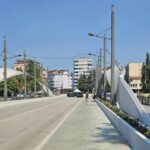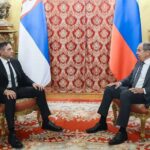- Kosovo to hold parliamentary election on February 9
The President of Kosovo, Vjosa Osmani, has scheduled a parliamentary election for February 9, 2025. The campaign will launch on January 7.
“After considering all opinions, February 9, 2025 was chosen as the optimal date that balances the interests of all parties involved. The president believes it is important that the election campaign begins after the end of calendar holidays that last until January 7,” said Osmani’s adviser Bekim Kupina.
This will be the first regular parliamentary election since the declaration of independence in 2008. The Kosovo government, led by the leader of the Self-Determination Movement (Vetëvendosje, LVV), Albin Kurti, will thus become the first government to serve a full four-year term.
- North Macedonia authorities say opposition plotting ethnic conflict
The Prime Minister of the Republic of North Macedonia, Hristijan Mickoski, said “former senior officials” with “huge sums of money” at their disposal are trying to provoke an ethnic conflict in the country.
“We will not allow it. I appeal to the public, the media and the citizens to refrain from any provocations, to ignore them. Sooner or later, the perpetrators of such provocations will be brought to justice,” Mickoski said on August 15.
The country’s media claim that the head of government accuses the largest Albanian party, the Democratic Union for Integration (DUI), which is currently in the opposition, of cooking up acts of provocation.
DUI leader Ali Ahmeti, in turn, dismissed Mickoski’s allegations as “untrue”. “DUI is committed to stability, security, peace, good inter-ethnic and inter-neighborly relations, as well as European integration, and rejects any attempts by the political government to destabilize it,” Ahmeti stressed.
It is known that DUI plans to start this September a campaign that would emphasize the illegitimacy of the sitting government of North Macedonia, of which the DUI is not part.
According to DUI representatives, as well as some pundits, a government coalition without a leading Albanian party on board violates the Ohrid Agreement of 2001, which put to a halt the domestic armed conflict between Macedonians and Albanians.
- EUFOR to conduct major drill in Bosnia and Herzegovina
The EU military mission in Bosnia and Herzegovina, EUFOR, will conduct Quick Response military exercise throughout the territory of Bosnia and Herzegovina from August 24 to September 16, 2024.
The annual exercise will involve EUFOR troops from 23 countries, which will be temporarily reinforced by reserve forces from Austria, Hungary, Romania, and NATO’s international peacekeeping forces from Kosovo (KFOR).
The Armed Forces of Bosnia and Herzegovina will support EUFOR in conducting the exercise by providing locations for training.
Between August 24 and September 16, residents of Bosnia and Herzegovina can expect to see an increase in the volume of troop movements, patrol and other activities, and the movement of reserve forces equipment and helicopters throughout Bosnia and Herzegovina.
EUFOR is taking all measures to minimize the impact of the exercise on members of the public, the mission stressed.
The purpose of the exercises is to demonstrate EUFOR’s combat readiness and to reaffirm constant support from BiH partners in maintaining a safe environment in Bosnia and Herzegovina, EUFOR commander Major General László Sticz and Chief of the Joint Staff of the BiH Armed Forces Lieutenant General Gojko Knežević said at a joint press conference.
- Vulin discusses strategic partnership with Lavrov
Deputy Prime Minister of the Republic of Serbia, Aleksandar Vulin, was on an official visit to Moscow, where he met with Russia’s Foreign Minister Sergei Lavrov.
Vulin and Lavrov agreed that bilateral cooperation between Serbia and Russia is at a really good stage and developing at all levels, primarily thanks to the friendly relations between the two presidents, Aleksandar Vučić and Vladimir Putin. The parties noted that both countries are interested in further developing the Serbian-Russian strategic partnership, and also discussed models and mechanisms for establishing cooperation between Serbia and BRICS.
Vulin underlined he is proud that Serbia is not part of the “anti-Russian hysteria”, having not imposed economic restrictions on Russia.
Following Vulin’s visit, the EU informed Serbia that maintaining ties with Russia amid the ongoing aggression against Ukraine is incompatible with the Union’s values and the accession process. “The European Union has been crystal clear with our partners: Relations with Russia cannot be business as usual after Russia’s unprovoked and unjustified aggression against Ukraine,” an EU representative told reporters, adding that Brussels “wants to count on all candidate countries as reliable European partners for common principles, values, security, and prosperity”.
It remains unclear at the moment whether the EU is set to react to the pro-Russian activity of the Serbian government with anything but warnings.
- Russia-Serbia trade plunges in 2023
In 2023, trade between Russia and Serbia decreased by approximately $1 billion year-on-year.
Nenad Popovic, Minister without portfolio in the government of Serbia and co-chairman of the Russian-Serbian intergovernmental committee on trade, economic, scientific and technical cooperation, spoke of this in an interview with the Russian newspaper Vedomosti.
In 2022, trade with Russia reached a record $4.28 billion, Popovic said. “Large-scale projects in energy, trade, infrastructure, innovation, and modern technology” were launched.
“Official statistical data for 2023 are yet to be released, but as per tentative estimates, the total volume of trade with Russia has decreased to $2.8 billion, to the level of 2021,” the Serbian minister noted.
“The decline is quite logically explained by the sanctions policy of the EU countries. … In the coming years, alongside Russia, we will work to return to the figures of 2022,” Popovic stressed.
In mid-August, Nenad Popovic visited Russia, where on August 13, the first meeting took place of the co-chairs of the Russian-Serbian intergovernmental committee on trade, economic, scientific and technical cooperation. On the Russian side, the Committee is chaired by Maksim Reshetnikov, the Minister of Economic Development.
The plans announced by the Serbian minister to expand Serbian-Russian cooperation at a time when Russia remains under EU sanctions shows Belgrade has no intentions to align its foreign policy with that of the EU, in particular, regarding a stance on Russia. At the same time, the sanctions introduced by the European Union also affect Serbian-Russian economic cooperation.



